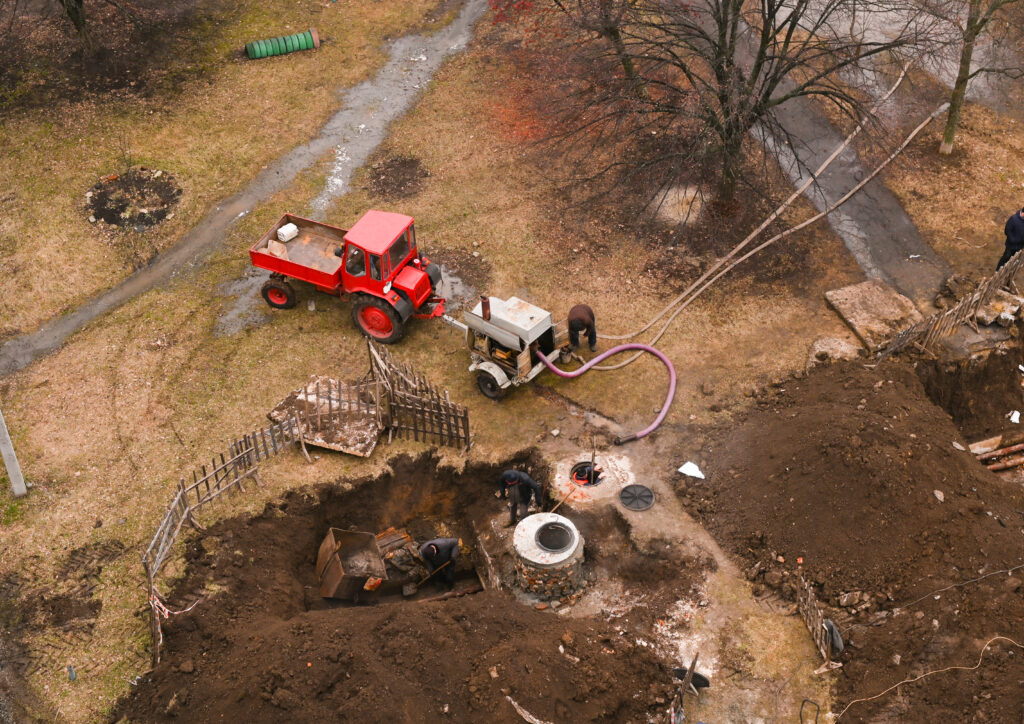Beneath the Surface: A Guide to Understanding Septic System Repairs

Septic system repairs can be intimidating and overwhelming for homeowners who have little knowledge about how septic systems work. However, understanding the basics of septic systems and their components is crucial in ensuring that your septic system remains functional and efficient.
What is a Septic System?
A septic system is an underground wastewater treatment system commonly used in rural areas where public sewer systems are not available. It consists of a septic tank, drain field, and soil absorption area.
Septic Tank
The septic tank is a large, watertight container buried underground that holds all the wastewater from your household plumbing system. It works by separating solid waste from liquid waste. The solids settle at the bottom of the tank while the liquids flow into the drain field.
Drain Field
The drain field, also known as a leach field or absorption area, is a series of perforated pipes buried underground. These pipes distribute the liquid wastewater from the septic tank into the surrounding soil for further treatment and filtration. The soil acts as a natural filter, removing harmful bacteria and pathogens before the wastewater reaches groundwater.
Common Septic System Problems
Septic system problems can arise from a variety of causes, such as lack of maintenance, excessive water usage, or damage to system components. Some common septic system issues include:
Clogged pipes and drain field: This is caused by an accumulation of solid waste in the pipes or drain field, which leads to slow draining and backups in your plumbing system.
Root intrusion: Tree roots can grow into septic system pipes or tanks, causing blockages and damage.
Septic tank leaks: Over time, the walls of a septic tank may develop cracks or holes leading to leakage of wastewater into the surrounding soil.
Improper maintenance: Failure to pump your septic tank regularly can lead to a buildup of solids, leading to clogs and other issues.
Signs Your Septic System Needs Repair
It is essential to be aware of the warning signs that your septic system needs repair. Early detection of problems can prevent costly repairs or replacements down the line. Some common signs include:
Foul odors: Sewage-like smells in your yard or inside your home may indicate a problem with your septic system.
Slow draining sinks and toilets: If you notice that water is taking longer than usual to drain, it could be a sign of clogged pipes or a full septic tank.
Standing water: Pools of water in your yard, especially near the drain field, can indicate that your septic system is not draining properly. Lush, green grass over the drain field: While it may seem like a good thing, this could be a sign of a leak in your septic tank. The excess nutrients from wastewater can cause an increase in plant growth.
DIY Septic System Repairs
While some septic system problems require professional assistance, there are a few repairs that you can do yourself, such as:
Replacing a damaged lid on your septic tank: A cracked or broken septic tank lid can cause leaks and allow debris to enter the tank. Replacing the lid is a simple and inexpensive fix.
Fixing clogged drains:This can be done by using a plumbing snake or removing the clog manually. However, if you are unsure of the location of the clog or do not have experience working with septic systems, it is best to call a professional.
Fixing a leaky toilet: A toilet that constantly runs or leaks can waste a large amount of water and put a strain on your septic system. Replacing the flapper or flush valve can solve this issue.
When to Call a Professional
Some septic system repairs are best left to professionals to avoid causing further damage or putting your health at risk. It is recommended to call a professional if:
Your septic tank needs pumping: Depending on the size of your household and the capacity of your septic tank, it is recommended to pump your tank every 3-5 years. A professional can safely and efficiently pump your septic tank without causing any damage.
You notice sewage backups in your home: This could be a sign of a serious issue with your septic system that requires immediate attention from a professional.
You smell strong odors: Foul smells are not only unpleasant, but they can also be an indication of a severe problem with your septic system. A professional can inspect and diagnose the issue to prevent further damage.
You notice pooling water near your drain field: This could indicate a major clog or failure in your septic system that requires professional attention.
conclusion
Understanding the basics of septic systems and their components, as well as knowing when to call a professional for repairs, is crucial for maintaining the efficiency and functionality of your septic system. Regular maintenance and early detection of problems can save you time, money, and potential health hazards in the long run. If you are unsure about any aspect of your septic system or suspect a problem, it is always best to consult a professional for assistance. So don’t wait until it’s too late – take the time to learn about your septic system and its needs today!




